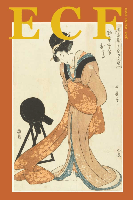
Eighteenth-Century Fiction
Scope & Guideline
Celebrating the Rich Tapestry of Eighteenth-Century Literature
Introduction
Aims and Scopes
- Interdisciplinary Literary Analysis:
The journal promotes an interdisciplinary approach, engaging with history, sociology, gender studies, and cultural studies to analyze literary works from the eighteenth century. - Focus on Marginalized Voices:
A notable emphasis is placed on the works of women, minorities, and other marginalized groups, providing critical insights into their contributions to literature and culture. - Cultural and Historical Contextualization:
Papers often situate literary texts within their broader historical and cultural contexts, exploring how literature reflects and shapes societal values and norms of the time. - Thematic Exploration of Identity and Gender:
The journal frequently addresses themes related to identity, gender, and sexuality, examining how these constructs are represented and challenged in eighteenth-century literature. - Engagement with Recent Scholarship:
The journal aims to engage with contemporary scholarship in the field, inviting innovative interpretations and critical discussions that reflect current academic trends.
Trending and Emerging
- Postcolonial and Global Perspectives:
There is an increasing focus on postcolonial studies and global perspectives, examining how colonial histories and cultural exchanges shape the literature of the eighteenth century. - Queer Theory and Gender Studies:
The journal is witnessing a surge in articles employing queer theory and gender studies, exploring complex representations of sexuality and identity in eighteenth-century texts. - Environmental Humanities:
A notable trend is the integration of environmental humanities, where literature is analyzed in relation to ecological concerns and the representation of nature during the eighteenth century. - Digital Humanities and New Media:
There is a growing interest in digital humanities, with papers exploring the impact of digital technologies on the study and dissemination of eighteenth-century literature. - Intersections of Literature and Science:
Emerging themes include the intersections of literature and science, particularly how scientific discourse influenced literary production and cultural understanding in the eighteenth century.
Declining or Waning
- Traditional Canonical Texts:
There is a noticeable decrease in articles focused on traditional canonical texts and authors, suggesting a shift towards more diverse and contemporary interpretations of literature. - Historical Biographies of Canonical Authors:
Research centered on biographical studies of major canonical authors is becoming less frequent, as the journal pivots towards analyses that prioritize thematic and cultural critiques over individual authorial narratives. - Conventional Literary Criticism:
The journal seems to be moving away from conventional literary criticism that emphasizes formalist approaches, favoring more innovative and interdisciplinary methodologies. - Focus on Historical Events:
Papers that heavily focus on specific historical events without a clear connection to literature are less common, indicating a preference for analyses that intertwine literature with broader cultural and social issues. - Narrowly Defined Genres:
There is a decline in discussions centered around narrowly defined genres of eighteenth-century literature, as the journal embraces a more expansive view of literary forms and their interrelations.
Similar Journals
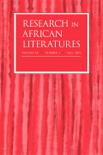
RESEARCH IN AFRICAN LITERATURES
Cultivating Scholarly Excellence in African NarrativesRESEARCH IN AFRICAN LITERATURES is a prestigious peer-reviewed journal published by Indiana University Press, dedicated to the critical exploration of African literary traditions, cultures, and texts. With an ISSN of 0034-5210 and an E-ISSN of 1527-2044, this journal stands out in the field of literature and literary theory, currently ranking in the 80th percentile of its category according to Scopus, making it a significant platform for scholars and researchers alike. Since its establishment, the journal has evolved through converged volumes from 2002 to 2024, consistently fostering innovative discourse and interdisciplinary approaches that illuminate the complexities of African narratives. Although it does not offer open access, the journal is integral for anyone engaged in African studies, providing critical insights that are essential for understanding the broader implications of literature within diverse cultural contexts. The journal's commitment to high standards of scholarship is reflected in its Q3 quartile ranking and its influential contribution to contemporary literary dialogue.

CANADIAN LITERATURE
Fostering Interdisciplinary Dialogues in Canadian LiteratureCanadian Literature is a distinguished journal published by the University of British Columbia, dedicated to exploring the rich landscape of Canadian literary studies. With its strong impact in the field, evidenced by its Scopus ranking of #197 out of 845 in the category of Arts and Humanities, specifically in Literature and Literary Theory, this journal serves as a pivotal platform for both emerging and established scholars. Covering a wide range of topics related to Canadian literature and culture, it aims to foster an interdisciplinary dialogue that reflects the diverse voices and narratives shaping the literary scene in Canada. Though the journal transitioned its coverage in Scopus after 2019, it continues to provide valuable insights and critical discourse in its publications. Researchers, students, and professionals looking to deepen their understanding of Canadian literature will find Canadian Literature an essential resource for contemporary scholarship.
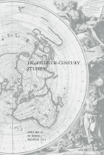
EIGHTEENTH-CENTURY STUDIES
Celebrating the richness of 18th-century cultural movements.Eighteenth-Century Studies, published by Johns Hopkins University Press, serves as a critical platform for scholars exploring the rich tapestry of the 18th century. With an ISSN of 0013-2586 and an E-ISSN of 1086-315X, this journal provides in-depth analyses and interdisciplinary perspectives that are essential for understanding the cultural, political, and literary movements of the time. As a Q3 ranked journal in both Arts and Humanities and Cultural Studies as of 2023, it occupies a vital niche in academic discourse, contributing to the field's vibrant scholarship despite its current ranking within the mid-tier of the Scopus rankings. This journal encourages submissions that present innovative research and engage with various methodologies, thereby fostering a deeper appreciation for the complexities of the 18th century. While it currently does not offer open access options, its esteemed reputation and commitment to quality scholarship make it an invaluable resource for researchers, professionals, and students alike. For those interested in the nuanced intersections of history, literature, and culture, Eighteenth-Century Studies stands out as a significant and indispensable resource.
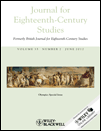
Journal for Eighteenth-Century Studies
Advancing Interdisciplinary Dialogue in Eighteenth-Century StudiesThe Journal for Eighteenth-Century Studies, published by WILEY, serves as a pivotal platform for scholars in the intersecting fields of cultural studies, history, literature, and the visual and performing arts. With an ISSN of 1754-0194 and an E-ISSN of 1754-0208, this journal reflects a rich tradition of academic discourse dating back to its inception in the 1970s, with converged years indicating its long-standing relevance within the academic community through to 2024. Categorized in the Q3 Quartile across several disciplines in 2023, it holds commendable Scopus rankings, notably being in the 74th percentile for Literature and Literary Theory. Despite not being an Open Access journal, its impact factor and scholarly contributions make it a valuable resource for researchers, professionals, and students committed to exploring the complexities of the eighteenth century. The journal aims not only to disseminate research but also to foster interdisciplinary dialogue, making it an essential read for anyone passionate about this transformative period in history.
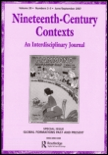
Nineteenth-Century Contexts-An Interdisciplinary Journal
Decoding the Past: Where Literature Meets CultureNineteenth-Century Contexts: An Interdisciplinary Journal is a pivotal academic publication that serves as a vital resource for scholars and students engaged in the exploration of the complex cultural, literary, and social dimensions of the nineteenth century. Published by Routledge Journals, Taylor & Francis Ltd, this journal holds a position within the Q2 and Q3 quartiles in the fields of Literature and Literary Theory and Cultural Studies respectively, illustrating its significance and relevance in contemporary research. Since its inception in 1987, it has fostered interdisciplinary dialogue and examination of the era's rich contexts, featuring articles that weave together historical, literary, and cultural analyses. Although the journal does not currently offer an open access model, its rigorous peer-review process guarantees scholarly integrity and quality. Housed in the United Kingdom, it caters to a global audience, thereby attracting diverse perspectives and insights, making it an essential publication for anyone looking to deepen their understanding of the complexities of the nineteenth century.

NEUE RUNDSCHAU
Celebrating the Evolution of Artistic ScholarshipNEUE RUNDSCHAU is a prominent journal published by S Fischer Verlag GmbH, specializing in the fields of literature and literary theory, as well as visual arts and performing arts. With its roots tracing back to its inception in 1969, this journal has evolved significantly, providing a platform for critical discourse and innovative scholarship in the arts and humanities. Although it experienced coverage changes, the journal remains a vital resource for researchers and academics, contributing to the rich dialogue surrounding cultural studies and artistic expression. Furthermore, while it is not available through open access, NEUE RUNDSCHAU offers essential insights into contemporary literary trends and artistic movements, ensuring its relevance and importance within the academic sphere. With Scopus rankings including a position in the 16th percentile for literature and literary theory, and a 10th percentile placement in cultural studies, the journal embodies a commitment to quality scholarly contributions, making it an invaluable asset for students, professionals, and researchers alike.

CAMBRIDGE QUARTERLY
Charting New Territories in Literary ResearchCAMBRIDGE QUARTERLY, published by Oxford University Press, stands as a dedicated outlet for scholarly discourse in the realm of Literature and Literary Theory. Since its inception in 1965, this journal has fostered a rich landscape for academic inquiry and discussion, with a commitment to exploring the intricate dynamics of literary studies up to 2024 and beyond. With an ISSN of 0008-199X and an E-ISSN of 1471-6836, CAMBRIDGE QUARTERLY offers a platform for innovative research, although it currently does not provide open access options. The journal is noted for its scholarly contributions, ranking in the Q4 quartile within its category based on the 2023 metrics, and holds the 635th rank in Scopus for Arts and Humanities specifically focused on Literature and Literary Theory, placing it in the 42nd percentile. As such, it appeals to researchers, professionals, and students alike, seeking to deepen their understanding of literary discourse and theoretical frameworks.
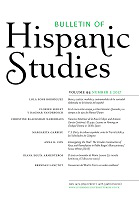
BULLETIN OF HISPANIC STUDIES
Cultivating Knowledge in the Heart of Hispanic ScholarshipBULLETIN OF HISPANIC STUDIES, published by Liverpool University Press, is a distinguished peer-reviewed journal dedicated to the exploration of Hispanic cultures, literatures, and linguistic studies. With an ISSN of 1475-3839 and an E-ISSN of 1478-3398, this journal is a vital platform for researchers, scholars, and students alike, offering critical insights and innovative research from a broad spectrum of perspectives within its fields. Notably, as of 2023, it holds a commendable position in Q2 of Linguistics and Language and Q1 in Literature and Literary Theory, demonstrating its significant impact in these disciplines. The journal spans a period from 2002 to 2024, providing a rich historical arc of scholarship in Hispanic studies. It operates in the United Kingdom and remains accessible through subscription-only models, ensuring a quality curation of content. With a native address at 4 Cambridge St, Liverpool L69 7ZU, England, the BULLETIN OF HISPANIC STUDIES remains committed to advancing knowledge and fostering dialogue in the ever-evolving landscape of linguistic and literary inquiry.

GYMNASIUM
Cultivating a Deeper Understanding of Ancient and Modern ScholarshipGYMNASIUM, published by Universitätsverlag C Winter Heidelberg GmbH, is an academic journal dedicated to the fields of Classics and Education. Since its inception in 1970, the journal has served as a platform for scholarly discourse, focusing on the intersection of classical studies and educational methodologies. Despite its discontinuation from Scopus coverage post-2021, GYMNASIUM remains an important resource for researchers, professionals, and students, fostering a deeper understanding of ancient texts and their relevance in contemporary educational frameworks. Current rankings place the journal in the Q4 quartile in both Classics and Education categories, reflecting its niche yet significant contribution to these fields. Researchers can access the journal's past issues through various academic libraries in Germany, enhancing interdisciplinary study and promoting scholarship across broader educational horizons.
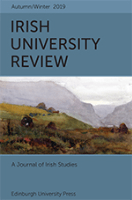
IRISH UNIVERSITY REVIEW
Advancing Scholarly Discourse in Irish LiteratureIRISH UNIVERSITY REVIEW is a distinguished academic journal published by Edinburgh University Press, specializing in the fields of Literature and Literary Theory. With an ISSN of 0021-1427 and an E-ISSN of 2047-2153, this journal serves as a vital platform for scholarly discourse on contemporary and historical literary studies related to Ireland and its cultural contexts. Located in the United Kingdom, the journal has achieved an impressive Q2 ranking in the 2023 category of Literature and Literary Theory, placing it in the 81st percentile among peer-reviewed arts and humanities journals globally, as per Scopus rankings. IRISH UNIVERSITY REVIEW is committed to fostering academic excellence and offers a range of access options for its readers, promoting both traditional and digital scholarship. With a publication timeline extending from 2002 to 2024, the journal is dedicated to enhancing understanding and appreciation of Irish literature through critical essays, reviews, and innovative research, making it an essential resource for researchers, professionals, and students alike.